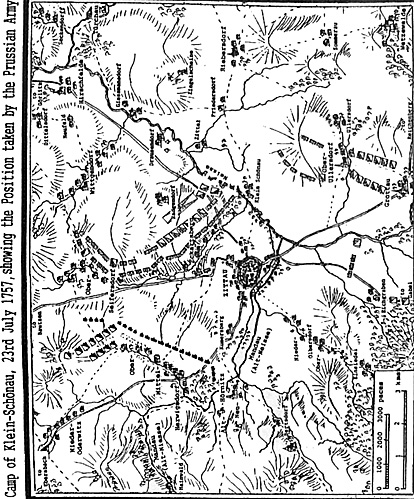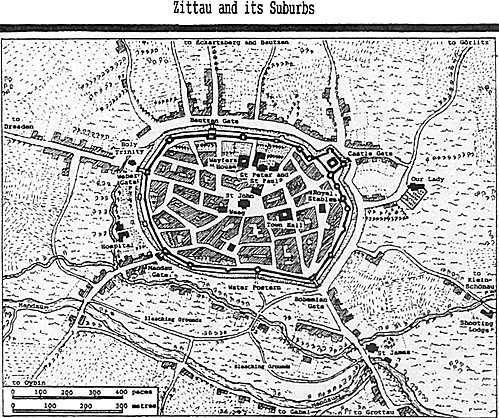During the night, there were several skirmishes in the suburbs of Zittau. This morning, we learned that 9 battalions together with the artillery and several wagons of baggage and bread, of which the army of the Prince of Prussia had great need, had sallied forth during the night to join that army. Lieutenant-General Graf von Schmettau and the Prince of Braunschweig led the sortie. The Prince of Prussia had facilitated this maneuver by advancing the right wing of his army, obliging the Austrians forming the investment on that side to retire.
Had the Austrians occupied the suburbs and heights properly, they would have been able to prevent this Prussian sortie. They should have loopholed the houses, barricaded the streets and sited cannon in the avenues.
We now know that there were no more than 500 horse involved in the sortie on the 21st. Aside from the 9 battalions who sortied out last night, there remain 5 other battalions inside the town.
At 11 o'clock this morning, we commenced firing upon the town with 44 pieces of artillery, including 12 6- and 3-pounder cannon, and two batteries of 16 howitzers, of which 6 are 12-pounders, 6 others are 6-pounders, and 4 are 3-pounders - all firing shells.
It did not take long to see the doleful result of this bombardment; fires started to take hold in three different places. These soon spread to the rest of the town, which appeared to be ablaze throughout. Several people had withdrawn into the cellars of the town to seek refuge from the shells; more than 200 of them were asphyxiated by the smoke and buried under the rubble of the burnt houses. The loss in this town is estimated at several million thalers; it had been one of the richest commercial centers in the whole of Saxony and was especially noted for the manufacture of linen.
Zittau has a double enceinte of plain walls. During the bombardment, the Prussians maintained themselves between the two walls; they contented themselves with making only occasional musket shots against the batteries. The outer of these walls is no more than about 4 feet high; the inner is about 12 feet high - more or less. The walls are crenellated and flanked occasionally by round or square towers, built between the two walls. In several places, there is a ditch in front of the walls; this ditch is not very deep.
Towards 4 o'clock, some Saxon soldiers (2 lieutenants, 21 NCOs and 216 privates), who were in the town, mutinied; 350 other soldiers joined them. Together, they broke down one of the gates and came out to join the Austrian troops with resounding cries of: "Long live the King of Poland!" As they had come out under a flag of truce, it was thought that the whole garrison had capitulated and we ceased firing, but the Prussian Commandant had no wish to hear any talk of surrender. Accordingly, we were obliged to re-open the cannonade.
About 6 o'clock in the evening, there was a trumpet call from the town. There followed a protracted parley in which the Commandant pretended that the call had been made without his authorization. The Prussian Commandant profited by this interruption to enable the escape of the 4 battalions that remained of his command. He left no more than 300 men in the town to amuse the Austrians and to conceal and facilitate the retreat of the others. Finally, those who remained, together with the Commandant, surrendered themselves prisoners of war. The name of the Commandant is Colonel-of-Pioneers Diericke. The other prisoners include: Major Kleist of Regiment Markgraf Heinrich, 3 captains, 5 lieutenants, 2 ensigns, 5 flag-bearers, 40 NCOs and quartermasters, 168 soldiers and 10 flags.
Once the town had surrendered, the Regiments Lothringen and Harsch, commanded by General Butler, entered Zittau. Inside the town, we took possession of a quantity of cannonballs and cartridges and also a magazine of flour that had escaped the flames. During the day, some dragoons of the Walloon Regiment Ligne captured two Prussian commissaries, one of these was wounded as they had tried to enter Zittau.
General Guasco, Quartermaster-General, went forward to reconnoiter a new camp on the side of Görlitz.
As the light faded, the two armies, having watched one another under arms throughout the day, erected their tents along their battle lines. Major-General Czerniczeff of the Russian service and Brigadier de Montazet of the French Dragoons are always admitted to the Austrian Councils-of-War.
The news from General Nádasdy is that he has marched from Leitmeritz to Levin. He says also that General Draskowitz has taken possession of the Schreckenstein Castle on the right bank of the Elbe. There he captured 1 major, 6 other officers, 200 soldiers, and 2 cannon.


More Journal of Horace St. Paul 1757
- Part 1: Introduction (June 30-July 14)
Part 2: Introduction and July 15
July 16, 1757
July 17, 1757
July 18, 1757
July 19, 1757
July 20, 1757
July 21, 1757
July 22, 1757
July 23, 1757
July 24, 1757
July 25, 1757
Back to Seven Years War Asso. Journal Vol. XI No. 3 Table of Contents
Back to Seven Years War Asso. Journal List of Issues
Back to Master Magazine List
© Copyright 2000 by James J. Mitchell
This article appears in MagWeb (Magazine Web) on the Internet World Wide Web.
Other military history articles and gaming articles are available at http://www.magweb.com